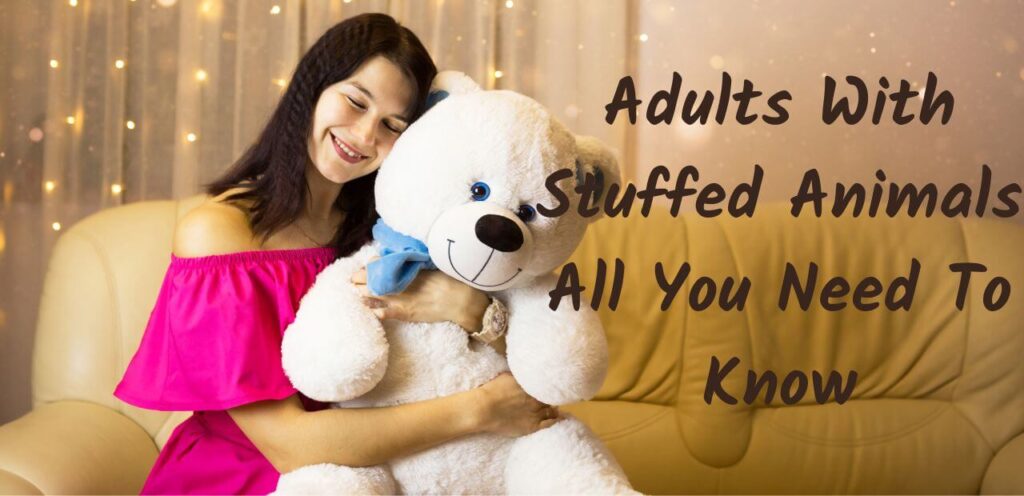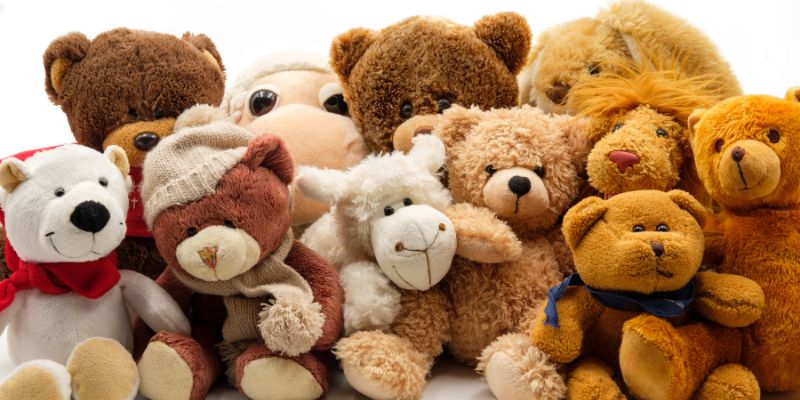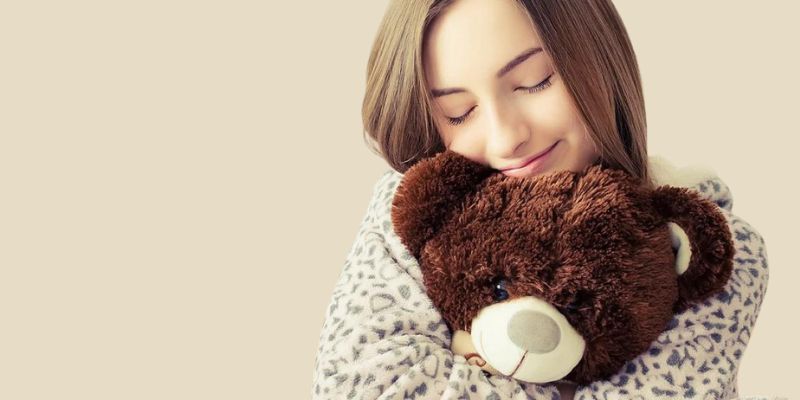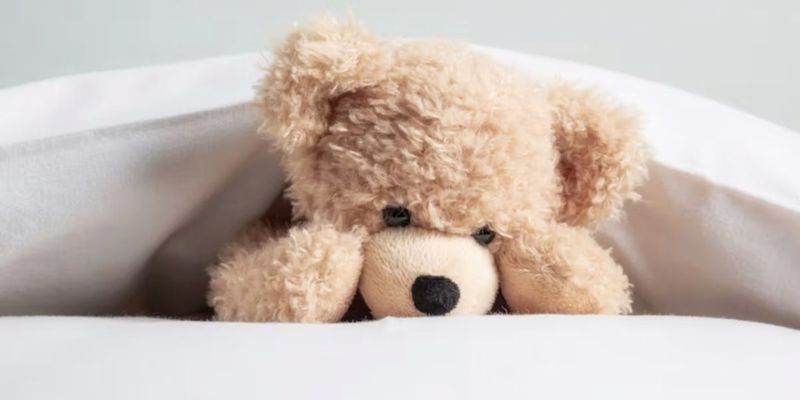Blog
Adults With Stuffed Animals
Many people think stuffed animals are just for kids, but Adults With Stuffed Animals are more common than you’d expect. Plush toys offer comfort, emotional support, and relaxation. Studies show they help reduce stress, ease anxiety, and improve sleep. For many, cuddling a plush provides a sense of security and nostalgia.
🧸 Why Adults With Stuffed Animals – Benefits & Emotional Support
Is It Normal for Adults to Have Stuffed Animals?
Many people find warmth, security, and emotional support in stuffed animals, just like they did as children. Psychologists suggest plush toys can reduce stress, ease anxiety, and improve sleep quality.
Studies show that Adults With Stuffed Animals often use them to cope with stress, grief, or significant life changes. A plush toy’s soft texture and familiar presence can be soothing, much like a weighted blanket. For some, these cuddly companions bring back happy memories and provide stability.
Whether you keep a stuffed animal for relaxation, emotional support, or simply because you love them, it’s completely normal. Taking care of your mental well-being and finding comfort in small things is a healthy part of self-care
Why Do Some Adults Still Play With Toys?
According to Jennifer Martin, a sleep researcher and professor at the Geffen School of Medicine at the University of California, Los Angeles, it’s crucial to comprehend why kids sleep with stuffed animals and why some adults love doing so. According to her, “Children frequently sleep with a specific blanket or stuffed animal because it’s one of the environmental cues to make their brain ready for sleep.” “The same motives are undoubtedly at play when an adult acts in that manner. Their brain receives a cue that it is time for sleep from the soft, fuzzy teddy they are snuggling with while they sleep. This relationship may also be influenced by popular cultural imagery, such as images of people sleeping with teddy bears in movies and television shows.
Martin claims that individuals feel calm when they are around stuffed animals because they are warm and fluffy. Nonetheless, she argues that the comfort item need not be a stuffed animal. Some individuals could have a favourite pillow or blanket that serves the same function.
Benefits of Adults With Stuffed Animals – Comfort and Well-Being
From an evolutionary perspective, sleep is a vulnerable time because you’re lying down, semi-conscious, and in the dark. We rely on our relationships with others to keep us safe since we are social beings. According to Wendy Troxel, a senior behavioural and social scientist at the nonprofit RAND Corporation and author of Sharing the Covers: Every Couple’s Guide to Better Sleep, stuffed animals can make people feel less lonely at night. According to her, “a charming, cuddly teddy bear may offer that sense of warmth and comfort.” When sleeping away from their parents, kids frequently cuddle with stuffed animals or blankets. Similarly, single individuals, separated from their partners or without pets, might utilize plush animals to sate their nighttime social connection needs.
According to Amy Wachholtz, director of clinical health psychology at the University of Colorado Denver, people in the US regularly anthropomorphize anything outside plush animals. We frequently give our cars or phones names and often chat with Siri and Alexa. These actions, coupled with sleeping with stuffed animals, promote a sense of community, which can be consoling when one feels alone or lonely.
Is it Weird For Adult Men To Sleep With Stuffed Animals?
Well, to answer the question, Is it normal for a 21-year-old to have stuffed animals? We have the following…Although academics haven’t thoroughly investigated how stuffed animals affect sleep quality, our experts concur that it’s neither strange nor unwise for adults to sleep with them, adds Wachholtz. She adds that she has observed adult patients bringing plush animals for hospital overnight stays. “If you feel better sleeping with a plushie, that’s because it is helping you,” she says. Thanks to the toys, the patients are more at ease while away from home.
One potential problem, according to Martin, is for adults with autism and stuffed animals, it might be tougher to fall asleep without. For a regular person, falling asleep might be tougher if they are used to sleeping with a stuffed animal but don’t have it while on vacation. According to her, people typically sleep better when their bedtime ritual is regular.
Sleeping with a plush animal might not help if you have sleep problems. According to Martin, simple solutions like a teddy bear might not be effective for people with persistent insomnia. Therefore they should consult a doctor who can recommend a sleep therapist.
But there’s no need to stop if you already sleep with one. She declares that I’m a huge believer in telling folks to do what makes them feel comfortable at night. “I wouldn’t worry if somebody is sleeping with a stuffed animal right now, and they enjoy it and get good sleep.”
Seven Reasons Why Adults With Stuffed Animals Find Comfort and Joy
People frequently believe that stuffed animals are only for kids, yet many adults own them if you can get them to confess it. According to a 2018 poll, 84% of men and 77% of women admit to keeping at least one favourite stuffed animal friend. Adults most often prefer the classic teddy bear as their favorite stuffed animal. Nevertheless, what advantages do these stuffed animals provide their adult owners?
1. Stuffed Creatures Provide People With a Sense of Security
It’s not unexpected that adults utilize stuffed animals and loveys like kids do because they provide comfort through times of change. These are “comfort objects” or “transitional things.” they can give us a stronger sense of stability as we transition from one period of life to another or even from one job or house to another. In most cases, adults sleep with childhood stuffed animals because it gives them a sense of security and lessens uncomfortable sensations like loneliness and anxiety, according to Margaret Van Ackeren, a qualified therapist. As things change, having that sense of security is crucial because it makes navigating change easier.
2. Plush Animals May Reduce Loneliness
Adults can feel alone and alienated in the modern world while surrounded by people. Research suggests we may be growing more isolated even as the internet continues to connect us all. We suffer when we are alone because humans are social animals. Stuffed animals can lessen feelings of loneliness and alienation while not being able to fully replace the social role that other people play in our life. This can help us cope with the interconnected and lonely modern world.
3. Stuffed Animals For Adults With Anxiety Are Realy Helpful
Stuffed animals for adults with anxiety is probably one of the best subtle solutions. Did you know that stuffed animals can be helpful in many of the same ways that live animals can? Living animals have been gaining popularity as therapeutic tools. One study found that people with disorganized attachment patterns found it easier to create secure attachments and mend damaged attachment bonds when given stuffed animals. People can lead more prosperous, happier lives by forming reliable emotional bonds. Stuffed animals are “…recommended in psychotherapy and for persons who have PTSD, bipolar, and other mental disorders,” according to Dr Aniko Dunn. This a wonderful gift!
4. Comfort Animals May Help With Grief
Stuffed animals can remind us of a deceased loved one, helping us navigate the grieving process and lessening the loss that comes with losing someone close to us. To strengthen your bond with your memories of a deceased friend or family member, you may order Memory Bears, a plush bear dressed in their outfit. A plush animal can be used to express your grief without raising suspicion or receiving criticism, and they provide ongoing solace.
5. Stuffed Animals Aid With Trauma Recovery
Some forms of therapy employ stuffed animals! Stuffed animals can be helpful in certain types of “re-parenting,” in which a trauma survivor learns to love and care for the toy (and eventually themselves) to heal from traumatic events as a child. This can lessen sentiments of self-loathing in the trauma victim and improve happiness and self-esteem. “Animals, whether live or stuffed, can enhance therapy for both children and adults by offering a place to experience and express emotions, a feeling of unconditional support, and grounding,” says Rose M. Barlow, professor of psychology at Boise State University. She extends this to people recovering from trauma brought on by neglect or abuse throughout childhood.
6. Stuffed Animals Remind Us of Childhood
7. Plush Animals Can Help You Relax
Many physiological issues, such as weight gain and a higher risk of cardiovascular disease, can be brought on by Cortisol. Several studies have shown that spending time with animals lowers stress. In actuality, even something as basic as caressing a companion animal, such as a dog or cat, produces meaningful reductions in cortisol levels. Did you know that cuddling a cuddly stuffed animal can have comparable cortisol-lowering effects? We can reduce stress by petting plush animals, which keeps us happier and healthier. There are stuffed animals made especially for stress and anxiety. To provide a double dose of comfort from your stuffed friends, weighted and aromatherapeutic stuffed animals are made to reduce stress.
We’ve selected a collection of plush animals ideal for grownups to ensure that even grownups may discover the ideal animal friend!
Emotional Attachment to Stuffed Animals in Adults and Why It’s Accepted
Many people think stuffed animals are only for children, but that’s untrue. Adults with stuffed animals are more common than you might expect. These soft and cuddly companions provide comfort, reduce stress, and offer emotional support, just like they do for kids.
Some adults may feel embarrassed about owning a teddy bear or sleeping with a plush toy, but psychologists say it’s completely normal. Studies show that keeping a stuffed animal can help with anxiety and loneliness and improve sleep. If you’ve ever wondered why some adults still love plush toys, read more about their benefits and why they are socially accepted.
Why Do Adults Have Stuffed Animals?
Stuffed animals bring feelings of warmth, security, and nostalgia. Many adults keep plush toys from childhood because they remind them of happy memories with family and friends. Others buy new stuffed animals to help them feel safe and relaxed during stressful times.
It’s common to see adults carrying sentimental objects, like a lucky charm or a childhood blanket. A stuffed animal can serve the same purpose—it brings comfort and stability, especially in difficult moments. According to Professor Bruce Hood from the University of Bristol, attachment to childhood toys is standard, even in adulthood.
Psychological Benefits of Adults with Stuffed Animals
Experts say that stuffed animals provide many mental health benefits. Here’s how they help:
1. Reduce Stress and Anxiety
Hugging a plush toy can lower cortisol levels (the stress hormone), helping people feel calmer. Just like petting a dog or cat, holding a stuffed animal can create a soothing effect on the body.
2. Emotional Attachment To Stuffed Animals Adults
Many people use stuffed animals to cope with loss, grief, or trauma. A teddy bear can provide comfort, allowing people to express emotions and feel less alone.
3. Improve Sleep Quality
Stuffed animals create a sense of security, making it easier to fall asleep. Their soft texture and familiar presence provide warmth and relaxation, helping adults sleep better.
The Social Acceptance of Adults with Stuffed Animals
Society is becoming more open to adults having stuffed animals. Many celebrities and influencers openly talk about their love for plush toys. Events like the Teddy Bears’ Picnic in the UK, supported by celebrities like John Thomson and Gail Porter, show that stuffed animals are essential to people’s lives.
Additionally, psychologists recommend stuffed animals for adults with PTSD, anxiety, and other emotional struggles. Dr. Aniko Dunn suggests that plush toys provide emotional stability and can be used in therapy.
Conclusion: Should Adults Feel Embarrassed?
Not! Adults with stuffed animals should never feel ashamed for finding comfort in plush toys. Whether for emotional support, stress relief, or nostalgia, stuffed animals positively affect people’s lives.
If you or a loved one needs a comforting plush friend, consider getting a large teddy bear or a soft companion. No matter your age, finding comfort in the little things is a healthy and natural part of self-care.
The Benefits of Sleeping with a Plush Animal
Have you ever wondered why so many people, including adults with stuffed animals, find comfort in sleeping with a plush toy? While they are often seen as childhood companions, stuffed animals provide emotional and psychological benefits for people of all ages. Let’s explore how they can help improve well-being.
1. Releases Oxytocin – The Comfort Hormone
Cuddling a stuffed animal triggers the release of oxytocin, a hormone that helps relax the mind and body. Oxytocin is also known as the “love hormone” because it creates feelings of warmth, happiness, and security. Just like hugging a loved one, holding a plush toy can calm and comfort you.
2. Reduces Loneliness and Stress
Many people experience loneliness at some point in their lives. A teddy bear or other plush companion can help fill that emotional gap, offering comfort. Studies show that hugging something soft can lower stress levels and provide a sense of connection, even when alone.
3. Supports Mental Health and Well-Being
Humans need emotional support, but sometimes, we don’t have someone to talk to. A stuffed animal can serve as a source of stability, helping to ease anxiety and improve mood. Plush toys provide a familiar and safe presence, especially helpful for people dealing with stress, PTSD, or emotional challenges.
4. Helps with Grief and Healing
Losing a loved one or going through a difficult time can be overwhelming. Stuffed animals offer comfort during moments of sadness by providing a physical object to hold onto. Unlike people, plush toys always offer non-judgmental support, helping individuals process their emotions at their own pace.
Final Thoughts
Now that you understand the benefits of adults with stuffed animals, it’s clear that plush companions provide more than just nostalgia. They offer warmth, comfort, and emotional support, regardless of age. Whether you need stress relief, better sleep, or a comforting friend, a stuffed animal can be a valuable addition to your life.
Looking for the perfect plush companion? Check out our Best Stuffed Animals For Adults to find one that suits you best!





